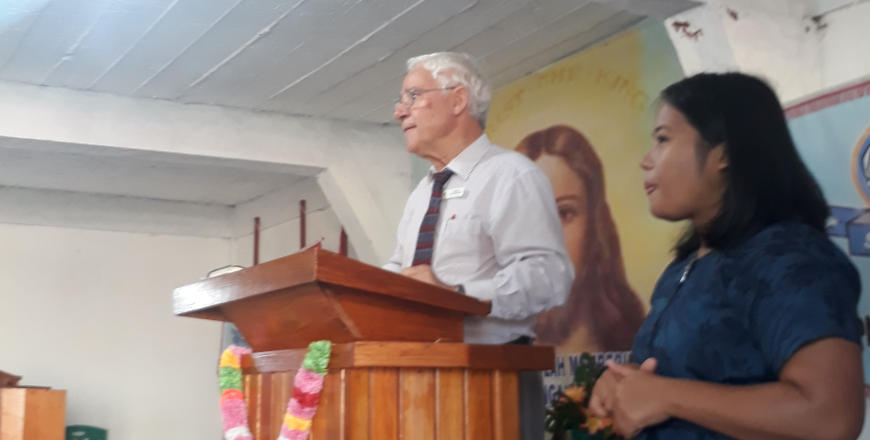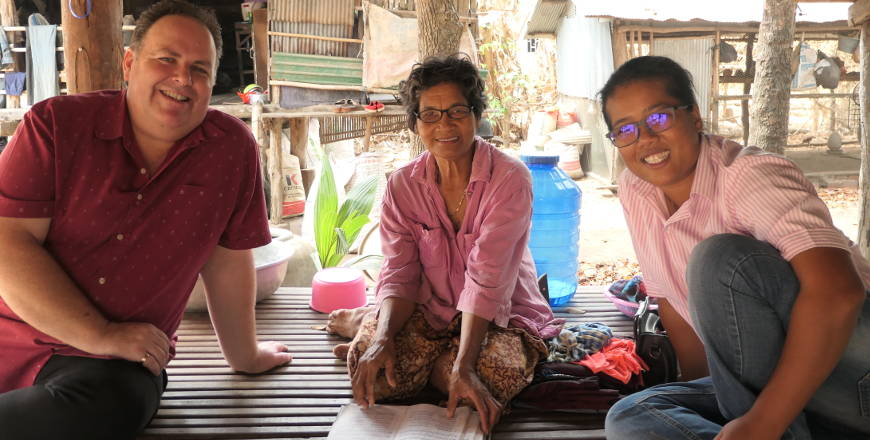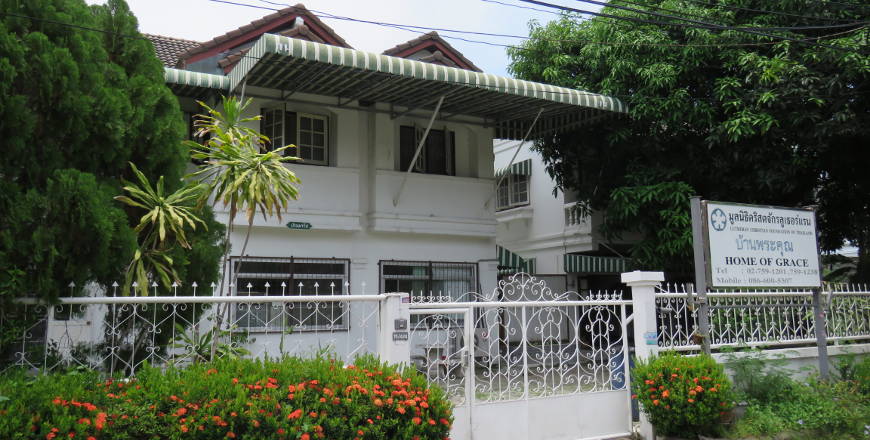Teaching ‘Christology’ at STT
It was my joy and privilege to spend two weeks with the staff and students at Sihabonghabong. Soon after our course was underway, one of the girls called me ‘Grandpa’ and this rapidly took off. In response I called them my ‘cucu’ (choo-choo), my grandchildren. This was typical of the affectionate way I was welcomed and made at home in the Sihabonghabong extended family, under the good-humoured leadership of Principal John Siragih.
At Silangit, I was met by Principal John, Evangelist Melina and the student driver Michael. The two hour drive to the seminary was another interesting experience on Asian roads, as we weaved and dodged past rice trucks, motor bikes, people, and sometimes dogs. The rains and the rice harvest had set in, and we constantly encountered rice trucks. As we often came within a few centimetres of a truck, I had to remember our Lutheran teaching on vocation: that it was the driver’s calling to avoid an accident, not mine to agonise each time how we could possibly avoid it!
I was well accommodated in the Bishop’s guest house across the road from the seminary. The meals were good, with a roster of students doing the cooking.
After the Sunday service at the nearby Gereja Kristen Luther Indonesia (GKLI) church, classes got underway on Monday with 60 students across all the seminary classes. The age range was 17 to 26 years; the men preparing to be pastors, the women to be evangelists.
Seminary chapel began at 8.00am. After a short break, classes ran from 9.00 to 10.30 and then 11.00 to 12.30. My translator, Delmi (‘Dell’) has been in South Australia a couple of times and is studying at a university in Medan for her Masters’ degree in English teaching. In addition to her vital role in the mornings, both of us gave groups of students some practice in English-speaking from 3.00pm.
On one occasion, during a car journey, Michael, the driver, raised with me what seems to be a key question: How could the Son of God die on the cross? We had a good discussion in the car and his question gave me a starting point for the classes. There seemed to be two factors at play: the Muslim context in Indonesia, where the majority religion emphatically denies that God could have a Son, and a Son who died; and secondly, a wider Protestant context which, following the Swiss Reformer John Calvin, sometimes claims that Christ’s risen and ascended body and blood are locally and spatially enclosed somewhere up in the sky and, as a result, cannot possibly be given to us orally in Holy Communion. We spent the first six days of the course on key New Testament texts like Matthew 16:15, where Jesus asks his disciples, “Who do you say that I am?” Over the final three days we opened the beautiful Bahasa-Indonesia edition of the Book of Concord and read key passages on who Jesus is from the Augsburg Confession and the Catechisms, culminating in the Formula of Concord’s articles on Holy Communion and The Person of Christ. Following a request from one of the students, Agus, we spent the last day exploring baptism and infant baptism, as there was wide concern about ‘charismatic’ churches that practise re-baptism.
On the Saturday morning we visited lovely, breath-taking Lake Toba, the largest lake in South East Asia and a World Heritage Geo-Park. In the afternoon we visited the Salib Kasih (cross of love) memorial park in honour of the Apostle to the Bataks, their founding father, Ludwig Nommensen. On Sunday morning, at the Bishop’s request, I preached on Revelation 7:9-17 (John’s vision of “a multitude from every nation, from all tribes and peoples and languages, standing before the throne and before the Lamb”) at a GKLI church in Lumban Siagian.
The Lonely Planet’s Indonesian phrasebook & dictionary was a constant companion, and a few words and phrases stuck (only to be forgotten the next time I wanted to use them)! One challenge was the pronunciation of biblical names. For example, when asked about my family, I listed my grandchildren, beginning with Levi and Isaac, but neither Delmi nor the students understood that these were biblical names until I said ‘Levee’ as in ‘levee bank’ and ‘Isak’ rather than ‘Aisak’. Nor did they understand who James was until I said ‘Jakobus’. From PNG days I was used to saying ‘Sisa Ogastas’ (Caesar Augustus), but in Indonesia I needed to say ‘Kaisar Ogastas.’
I thoroughly enjoyed the Batak singing and musicianship, and their wonderful sense of humour. Two examples have stayed with me. As I was winding up the last morning of teaching, Michael thanked Delmi. He went on to say he was about to begin two years of vicarage, during which he was not allowed to marry, adding: “Delmi, will you wait for me?” He had everyone cracking up. No less so, on the lovely farewell evening attended by the whole community and Bishop Esra, Principal John spoke of his concern during the long wait for me to be processed on arrival at Silangit. All the other passengers had picked up their luggage and left. Then he saw two coffins discharged from the plane being loaded in a hearse. He started to wonder if I was in one of them!
If you would like to consider the opportunity to serve as a volunteer in mission, serving in practical ways, teaching English, teaching in the seminaries and institutions of our partner churches, or in local churches, you are invited to phone Nevin on (08) 8267 7300 or email nevin.nitschke@lca.org.au. For more information, go to http://www.lcamission.org.au/join-gods-mission/volunteer/
Read more stories about volunteering at http://www.lcamission.org.au/category/join-gods-mission/volunteers/




